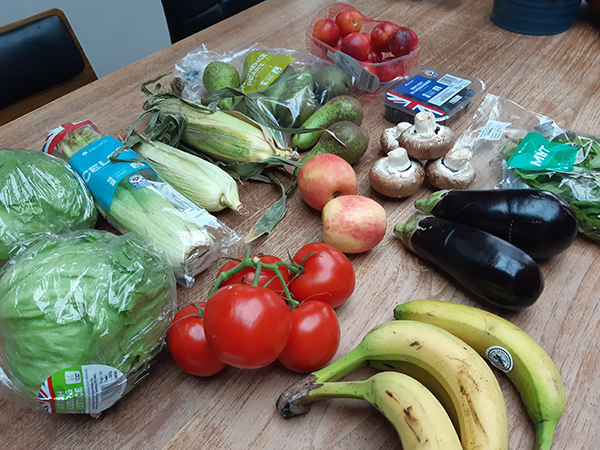Save on food: ‘how I saved £200 a month on our supermarket bills’

Lily Canter has found a simple way to claw back money by halving her spending on groceries after rising bills created a big hole in the monthly household finances.
My husband and I have always been pretty frugal, particularly when it comes to food shopping.
For years, we have been doing a weekly shop in Lidl or Aldi, topping it up with missing bits from Sainsbury's once or twice a month.
As a family of four, we get through a lot of food, particularly since my active nine-year-old son is always hungry no matter how much he eats.
We eat healthily, cook from scratch and have been getting an organic veg box delivered for years.
All of our food and bills are paid from a joint account which my husband and I pay into each month.
But, after a number of bills rocketed, we dipped into our overdraft for the first time last year.
Top supermarket deals of the week
Why I had to cut spending on food
When I investigated, I realised that higher energy and Council Tax bills were creating a £350 deficit every month in our finances.
We already switch utilities, insurance and broadband on an annual basis if a better deal can be found and there's not much we can do about our Council Tax bill, so the only way to claw back the money was to look at our food spending.
On average, we were spending £100 a week on food, sometimes up to £120.
I know other four-person families with kids the same age who spend far more, so I thought we were already being pretty careful.
But I wondered if there was more we could do.
The first step was to cancel our veg box, which was £18 a week.
Although the produce is noticeably better quality, it often contained random things we didn't always use.
But the major game changer for us was one simple thing: meal planning.
We decided to do this to coincide with the school holidays.
Usually, during term time, the kids eat at an afterschool club or have a top-up dinner around 5pm and then we cook a second meal later in the evening for the two of us.
But to keep things simple we decided to all have one meal together in the evening, to save cooking twice every day.
We have never meal planned. Instead, we tended to just spontaneously decide what to eat each evening.
And when it came to shopping, we made a list of everything that was low or used up in the cupboards. And we were pretty good at sticking to the list.
The problem is this is not actually cost-effective.
For example, you might buy pasta as you are running low but if you don't have a pasta meal that week, then actually it is a waste of money.
It leads to things languishing at the back of the cupboards to be eventually chucked out when they are long past their best.
Shopping list, portions, ugly fruit and veg: how to cut your food waste

Meal planning with wonky veg
The meal planning is now all based around the Lidl wonky veg box.
This was a product I had heard of but never actually seen – and that's because it is an absolute steal, and the boxes go very quickly.
They are in the store every day (usually beyond the till) but you need to get there within the first 15 minutes of opening otherwise they disappear.
The box is £1.50 and is packed full of random fruit and veg.
For example, one week I got potatoes, carrots, peppers, lettuce, peaches, apples, cauliflower, coriander and aubergine – all for £1.50.
The equivalent cost of the individual items would be around £10-£15.
And there is absolutely nothing wrong with the produce.
It's not overripe, bruised or even 'wonky'. It's just a bargain.
Once we have picked up our £1.50 box, we see what is inside and plan evening meals around it.
The following day one of us returns to Lidl with a list based on the plan plus additional items for breakfast, lunch and healthy snacks.
Planned meals include lentil spaghetti, meat and veggie barbecue, prawn curry, seafood paella, rice patties and Sunday roasts.
Cut your food and drink bill with these tips and tricks
Buying only what we need
Thanks to this change in how we shop, we are now only buying what we need rather than what we don't have in the cupboards. It is cheaper and far less wasteful.
The first week I was gobsmacked when our till receipt was just £47 (plus £1.50 for the veg box bought the previous day). And this still included items like organic milk, chicken, eggs and cucumber.
And to save even more money we always make sure we have activated all the discount offers on the Lidl app.
This might only save pennies but every time you scan your digital Lidl card at the till it calculates how much you’ve spent.
If you spend more than £250 a month, you get a 10% discount off your very next shop, which further increases our savings.
We still do an occasional top-up shop at Sainsbury's for items we can't get in Lidl, but this is also greatly reduced.
Without wanting to sound like an advert for Lidl, the discount app they offer is simply one of the best ones around and has created loyal customers out of us.
Another thing we have stuck to religiously is that we don't buy alcohol as part of the food shop.
This is paid for separately using our personal accounts, which means we protect the joint account.
The knock-on effect is we are drinking less alcohol and spending less money which can only be a good thing.
By halving our food spending, we have saved around £200 a month.
This means we still have a £150 shortfall but an extra £75 each is easier to find than £175 each.
With a little bit of planning and strategic early morning shopping, it really is possible to dramatically slash your food bill.
Comments
Be the first to comment
Do you want to comment on this article? You need to be signed in for this feature
